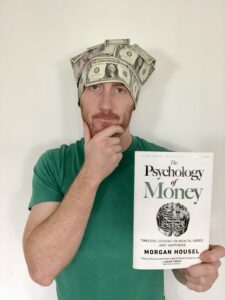 Good investing is not about getting the highest returns. It’s about getting good returns that can be repeated for the longest period of time. “The historical odds of making money in U.S. markets are 50/50 over one-day periods, 68% in one-year periods, 88% in 10-year periods, and (so far) 100% in 20-year periods.” The reality is that “there are few financial variables more correlated to performance than commitment to a strategy during its lean years—both the amount of performance and the odds of capturing it over a given period of time.” With this in mind, the question remains: Why do so many of us buy and sell our stocks when it may in fact be best to do the opposite?
Good investing is not about getting the highest returns. It’s about getting good returns that can be repeated for the longest period of time. “The historical odds of making money in U.S. markets are 50/50 over one-day periods, 68% in one-year periods, 88% in 10-year periods, and (so far) 100% in 20-year periods.” The reality is that “there are few financial variables more correlated to performance than commitment to a strategy during its lean years—both the amount of performance and the odds of capturing it over a given period of time.” With this in mind, the question remains: Why do so many of us buy and sell our stocks when it may in fact be best to do the opposite?
The answer is our emotions. Our emotions are what compel us to get married, to root for our favorite sports teams, and to buy our favorite foods. It would be difficult to choose a bag of chips at the supermarket without our emotions—with so many options, all boasting different flavors and styles, pure rationality gets us stuck; we need our emotions to kick in and grab the bag that ‘looks’ the best. In his book, our author has abundant examples of how we behave just the same when it comes to our money and investments, ultimately leading us to buy and sell when we shouldn’t.
One of Housel’s most important financial observations is recognizing what our time horizon is. Are we investing for a three-month period, a three-year period, or a thirty-year period? The answer to this question will determine what kinds of investments we should make. “Your personal experiences with money make up maybe 0.00000001% of what’s happened in the world, but maybe 80% of how you think the world works,” Housel writes, “so equally smart people can disagree about how and why recessions happen, how you should invest your money, what you should prioritize, how much risk you should take, and so on.” There is rarely, if ever, a single answer to a financial question, and it is incumbent upon each of us to keep our time horizon in mind when making investment decisions.
We are only able to do this, however, if we have some money. Despite our desire to invest and grow our money, it is important to remember to keep some savings, or a “margin of safety,” in case of an emergency. Housel encourages his readers to save money for the unpredictable events that life will surely throw at us. A sudden medical illness or broken car part, for example. How many of us were financially prepared for Covid-19?
We invest to get wealthy, and while becoming wealthy may entail some risky bets on the stock market, the key to staying wealthy is not spending. “Wealth is the nice cars not purchased. The diamonds not bought. The watches not worn, the clothes forgone and the first-class upgrade declined.” Real wealth is having control over our time, and getting to do what we want, when we want, with who we want, for as long as we want. The great philosopher Aristotle himself once wrote that “wealth is evidently not the good we are seeking; for it is merely useful and for the sake of something else.” That something else is the freedom to do what we want with our time, and, by extension, our lives.
In sum, we should all save a little more than we think we should, invest our money for the long term, and expect the unexpected. Ups and downs in the market happen all the time for reasons we often cannot predict, and buying and selling in an effort to beat the market will rarely lead to large returns. The best investing is done over a long period of time when our money is able to compound and grow. This only works if we don’t let our emotions highjack our brains and we stick to our time horizon. Our goal is not wealth; our goal is control over how we spend our time.


